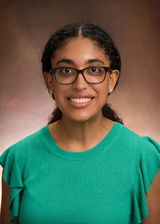A Q&A with Rachel Keashen, Cardiac Center Nurse Practitioner
At Children’s Hospital of Philadelphia (CHOP), Advanced Practice Providers (APPs) are among the many clinicians that provide expert care for CHOP patients and families. Their advanced training and expertise enable them to diagnose and treat a wide range of health conditions, making them an essential part of the healthcare team. There are several types of APPs at CHOP; they work in a variety of settings; play a crucial role in delivering comprehensive, specialized care to patients and families; and provide professional education, presenting at regional, national and international conferences.

Across the Cardiac Center, patients are cared for by 80 APPs, including nurse practitioners, physician assistants and clinical nurse specialists. Rachel Keashen, CPNP, is a nurse practitioner in general cardiology providing outpatient care at CHOP’s Voorhees Specialty Care Center. In this article, she discusses her education and training, addresses common misconceptions about APPs, and explains why she loves working with CHOP Heart Warriors.
Q. What is your role in the Cardiac Center?
A. In my 10+ years at CHOP, I’ve filled multiple roles. In the Cardiac Center, I’ve been part of the interventional cardiology team, coordinating cardiac catheterization procedures and seeing patients in clinics alongside the cath team attendings. I also worked on our cardiac thrombosis team, managing anticoagulation for patients, both inpatient and outpatient. Since January 2023, I’ve been working out of our Voorhees Specialty Care Center, caring for our outpatient cardiology patients.
In addition, I (along with other Cardiac Center APPs), am involved in outreach and leading the work to make the patient/family experience better. I personally do school nurse outreach, helping regional school nurses learn how to recognize cardiology symptoms they might encounter, as well as primary care outreach for pediatricians who want to learn about the cardiac care available here at CHOP. I also work with the Cardiac Center’s Patient/Family Experience Council on initiatives to help make the cardiology experience less scary for kids. And I’m Co-Chair of the Cardiac Center’s Patient/Family Experience Council’s DEI Initiative, which, with philanthropic support, aims to improve equity for the many diverse families that come to CHOP for care.
Q. How did you train to become a nurse practitioner?
A. To become a nurse practitioner, you need a Bachelor of Science (BSN) in Nursing and a Master of Science in Nursing. I earned my BSN as a second degree student from the University of Pennsylvania; I also have a bachelor’s degree in psychology from Rowan University. To get your MSN, you have to specialize in the patient populations you want to work with. I specialized in working with acute and chronically ill pediatric patients. I first starting working in the Cardiac Center as a registered nurse (RN) and knew that is where I wanted to work once I completed graduate school.
Just like doctors, nurse practitioners and physician assistants have to become board certified (which means they have to pass a specialty-specific exam of medical and clinical knowledge and diagnostic skills). We also have to, like doctors, earn continued medical education credits to keep our certifications current.
For my current role caring for general cardiology outpatients, I received intensive specialized training across the Cardiac Center before I began to see patients independently. I spent a year shadowing my cardiologist colleagues in general cardiology, learning about how they explain and manage various conditions. I also spent time in other testing areas. I shadowed echo attendings as they read echocardiograms. I spent time in the Cardiovascular Exercise Physiology Laboratory, learning the different reasons patients are referred to the exercise lab, how the tests are given and how they are interpreted. After a year, I began to see patients with a supervising cardiologist and then progressively began to see patients independently.
Q. What are some of the most common misconceptions you’ve heard about seeing a nurse practitioner or physician assistant for an outpatient appointment?
A. I’ve heard that families worry they are going to have a less complete appointment with an APP – that they won’t receive all of the testing or get the referrals their child needs. It’s important to note that patients with complex congenital heart disease will typically see a cardiologist rather than an APP. When a patient sees me for an outpatient appointment, they are going to get the same level of care and attention as they would receive from one of my cardiologist colleagues. If I do have a question or want confirmation on my diagnosis or treatment plan, there is always a cardiologist available. It’s important for families to note, however, that my cardiology colleagues provide that same support to each other as well. We all take a team approach to cardiac care.
Q. What do you love most about working in the Cardiac Center?
A. On the professional side, I love that we don’t take care of these kids in a vacuum. From intake and anesthesia to interventional cardiology to the surgical team to the outpatient team, there is always someone to call for advice or refer a patient to. I really enjoy the collaborative nature of cardiology. When a patient is diagnosed with congenital heart disease, we begin a life-long journey together and form meaningful long-term relationships. When patients are diagnosed as teenagers, we get to help their families face unexpected diagnoses and navigate the changes to their lives, which I find meaningful. I really enjoy supporting the journey from diagnosis all the way to the transition to adult cardiology care.